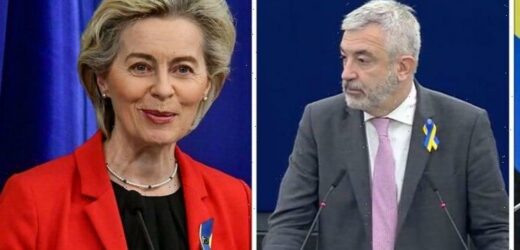Ukraine: Putin speaks with German Chancellor Olaf Scholz
We use your sign-up to provide content in ways you’ve consented to and to improve our understanding of you. This may include adverts from us and 3rd parties based on our understanding. You can unsubscribe at any time. More info
EU sources have said that the bloc’s plot to wean itself off Russian coal, which it spent €5.2billion (£4.3billion) importing last year, won’t take effect until mid-August. The EU Commission initially suggested giving three months before existing contracts with Russia get terminated, according to a document seen by Reuters. This would mean Russia could still export coal to the EU for 90 days after sanctions get slapped down.
One diplomat said that although some are long-term, most coal contracts are short-term.
This means that the 90 day wind-down period would have let short-term contracts run out without the need for cancellation, which would avoid legal risks.
But after pressure from Germany, the source claims, the coal ban will allegedly not take effect until mid-August, a month after the bloc initially proposed it takes place.
Germany imports the most Russian coal in the whole bloc, accounting for 25 percent of the country’s needs.
The country, which gets more than half its gas from Russia, has also been blamed for hamstringing an effective EU sanction package against oil and gas.


The bloc has come under fire for lagging behind its western counterparts in targeting Russia’s energy sector.
But the 27-member union’s new sanctions package is poised to take effect in the coming days.
It marks the fifth round of punishments against Vladimir Putin’s brutal Ukraine invasion, which are set to be announced shortly.
The sanctions will reportedly take effect after the EU publishes the measures in its official journal.
And the bloc has threatened to go tougher on Russia after it allegedly committed war crimes in Bucha, a town on the outskirts of Kyiv.

Energy sanctions have topped the list of discussion as the bloc still hands billions to Putin for his hydrocarbons.
While getting into bust-ups on oil and gas, member states appeared to be in relative agreement about banning coal, the cheaper energy source.
Targeting coal will involve phasing out deliveries and banning Russian vessels and truck from entering the EU.
The package will also likely include harsher sanctions on four key Russian banks, which will be totally cut off from the markets.
But Russian companies will still be able to export coal to the EU until mid-August under existing contracts.
DON’T MISS
US reveals hypersonic missile test, risks escalating Russia tension [REVEAL]
Putin threatens to STARVE Germany in horror retaliation to measures [INSIGHT]
EU unleashes legal fury – Portugal sued over radiation failure [REPORT]


Although a lot of Europe’s coal purchases of Russian coal are made in the spot market, not long-term contracts.
This means purchases would be stopped immediately once sanctions are slapped down.
The UK meanwhile, has only agreed to phase out Russian coal imports by the end of the year.
The Foreign Office has also announced a ban on imports of iron and steel products, reportedly a major source of revenue for Russia.
And a further eight oligarchs in these industries have been targeted by sanctions.
Source: Read Full Article

